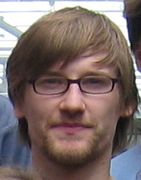Talk " FOSS im Umfeld des neuen Personalausweises ", together with Dominik Oepen, Friday, 13.5.2011, Room Berlin II, 5 - 6 p.m: Sowohl Gegner als auch Befürworter des seit November 2011 in Deutschland verfügbaren neuen Personalausweises (nPA) profitieren von freien Implementierungen der benötigten Software, denn sie sorgen für mehr Transparenz. Der Vortrag stellt die Software vor, welche im Rahmen des offenen Anwendungstestes für den neuen Personalausweis (nPA) an der Humboldt-Universität zu Berlin entwickelt wurde. Zur Sprache kommen sowohl die Implementierung der grundlegenden kryptografischen Protokolle in der Bibliothek OpenPACE, als auch darauf aufsetzende Werkzeuge, wie etwa das Kommandozeilentool npa-tool. To Frank's talk
Backstage with Frank
Frank, how are you personally involved with OpenPACE?
Dominik and me are doing researches about the new Identity Card for quite some time. We both got into it when we started our thesis - I hope to finish mine soon. Although we only looked at the new Identity Card, we realized that the PACE protocol reaches beyond chipcard applications. In fact, it is of use as soon as strong session keys depend on weak secrets. We not only discovered new things, I believe, but with openPACE also created something of immediate practical use for everyone.
Can you recommend Berlin's security scene?
Berlin is a rich place for conferences and other security events. There are a couple of universities as well, organisations, associations and companies, who dig the issue and go into detail. A complete overview is hardly possible. I really enjoyed the 27th chaos communication congress. I'm also looking forward to LinuxTag 2011, in which I took part as visitor last year.
You are a student and work as research assistant at Humboldt University of Berlin. What does a typical "Frank-day" look like?
Security of computer systems is part of my studies and my thesis. Hereby I deal with new research papers and new practical works. Also, I'm giving a course in IT security this term, and I like bringing both aspects together.
Why did you choose to present a talk at LinuxTag 2011?
There are many interesting people with exciting projects at LinuxTag. One the one hand, I'm looking forward to learn more about them, on the other hand I hope to call their attention to my and Dominik's work. For, the technique of the new Identity Card affects every german citizen. But institutions tell you what to do with it. With our software, you can do security checks on your card, create case studies and try to avoid security bugs third-party software might bring along.
Frank's Data Sheet
Wohnort: Berlin
Alter: 28
Lieblings-Programmiersprache(n): C and Python
Lieblings-FOSS-Betriebssystem-Derivat(e): Debian
What is FOSS and Linux all about? My answer in 3 sentences:
The program code of FOSS and Linux is open, available and allowed to be changed, which is different with proprietary software. But more important than "What" is the question "What for". Open source software enables self-determination, transparency, realisation of creative ideas and co-working with other volunteers.

